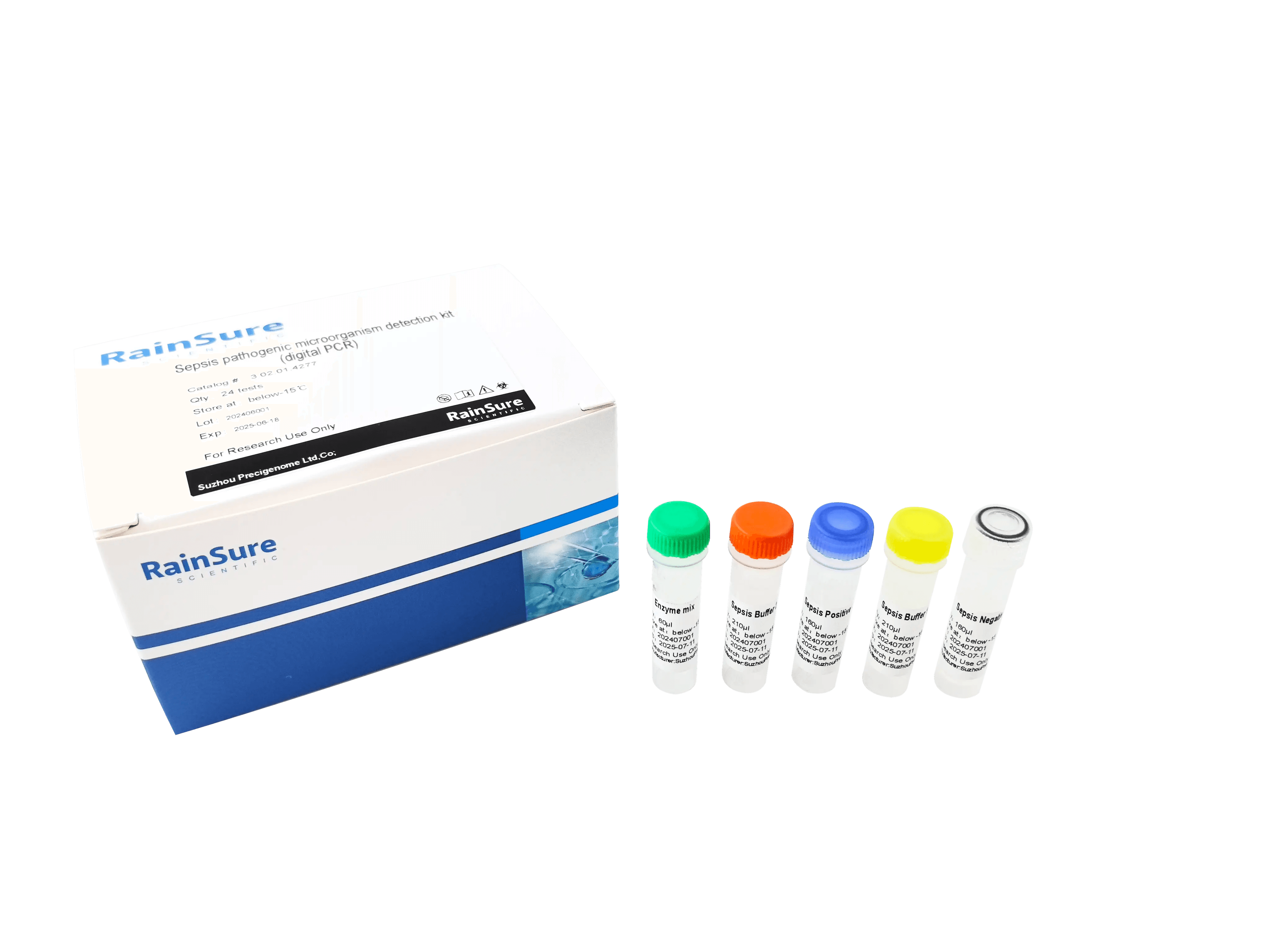Sepsis Pathogenic Microorganism Detection Kit (Digital PCR)
Product Highlights
- Results can be obtained directly from patient whole blood in less than 5 hours without the need for blood cultures
- Highly automated; prevents laboratory-acquired infection
- The solution has been validated on ICU patient samples from more than 10 hospitals with over 2,000 beds
- Panels cover up to 31 highly prevalent bacteria and fungi and 9 common clinical antibiotic resistance genes (ARGs).
Product Description
A high-multiplex digital PCR assay designed for direct whole-blood detection of critical sepsis pathogens, offering superior sensitivity, rapid turnaround, and actionable results.
Why sepsis?
Bloodstream infection refers to a systemic infectious disease caused by bacteria, viruses, fungi, etc., invading the bloodstream, which can lead to sepsis. Sepsis refers to life-threatening organ dysfunction resulting from a dysregulated host response to infection. It has the characteristics of high morbidity, a high disability rate, and a high mortality rate, and is one of the causes of in-hospital death in patients in the intensive care unit.
The number of morbidities is high:
- Global: 49 million people/year (WHO, 2020)
- China: about 6.11 million people/year
High mortality rate:
- Global deaths: 11 million/year (WHO, 2020)
- Morbidity and mortality rate of more than 30%, plus cognitive dysfunction rate of 16.7%
Rapid onset:
- 58% increase in risk of death for each 6-hour delay in treatment
- Delaying treatment by two days increases the risk of death by 38.8 times
The gold standard – blood cultures:
- Low sensitivity:
- Broad-spectrum antibiotics are often misused, inhibiting colony growth
- Many pathogens cannot be cultured
- Longer incubation:
- More sets of blood are required
- Detection is empirical and susceptible to environmental influences
- Long testing time:
- 3–5 days — often too slow for effective diagnosis
- High sample volume requirement:
- 40–60 mL of blood needed → poor clinical accessibility
Comparison of Standard Diagnostic Methods vs. Digital PCR
Technology | Detection | Sensitivity | Specificity | Cost | Overall assesment |
blood culture | 3-5d | + | + | + | Gold standard for pathogen identification, but slow and technologically outdated, often failing to meet urgent clinical needs |
mNGS / TNGs | 24–72h | +++ | ++ | ++++ | High cost and long turnaround time; performance affected by host background, resulting in variable sensitivity and specificity; limited ability to detect antimicrobial resistance |
qPCR (FilmArray) | 17.2h | ++ | +++ | ++ | Useful for targeted detection with good specificity, but requires prior blood culture and cannot provide absolute quantification |
digital PCR | 4-5h | +++ | +++ | ++ | Fast, highly sensitive, and highly specific with absolute quantification; RainSure's solution enables direct whole-blood detection with no culture step required |
Product Specifications
Multiplex Detection Panels:
- Panel 1 & 2: 21 key pathogens: 8 Gram-negative, 7 Grav-positive, 6 fungi (CE-IVD Certified)
- Panel 3: 10 additional pathogens (Research Use Only)
- Panel 4: 9 antibiotic resistance genes (Research Use Only)
Position 1 | Position 2 | Position 3 | Position 4 | Position 5 | ||
Panel 1 | FAM&HEX | Staphylococcus capitis | Acinetobacter baumannii | Candida tropicalis | Candida krusei | Staphylococcus epidermidis |
ROX&Cy5 | Enterococcus faecium | Cryptococcus neoformans | Stenotrophomonas maltophilia | Klebsiella pneumoniae | Streptococcus pneumoniae | |
Cy5.5 | Serratia marcescens | |||||
Panel 2 | FAM&HEX | Bacteroides fragilis | Escherichia coli | Candida parapsilosis | Candida glabrata | Enterobacter cloacae complex |
ROX&Cy5 | Enterococcus faecalis | Haemophilus influenzae | Pseudomonas aeruginosa | Staphylococcus aureus | Candida albicans | |
Cy5.5 | Internal Control | |||||
Panel 3 | FAM & HEX | Burkholderia cepacia | Citrobacter freundii | Streptococcus pyogenes | Morganella morganii | Staphylococcus haemolyticus |
ROX & Cy5 | Klebsiella aerogenes | Klebsiella oxytoca | Corynebacterium striatum | Proteus mirabilis | Moraxella catarrhalis | |
Panel 4 | FAM & HEX | OXA23 | VanA | VanB | ||
ROX & Cy5 | OXA48 | MecA | MecC | blaKPC | blaNDM | |
Cy5.5 | SmeDEF |

